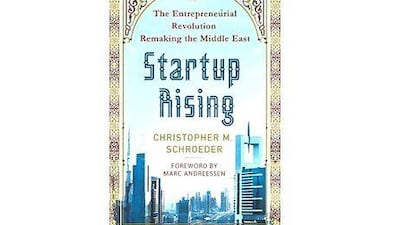In a region where politics and oil tend to overshadow everything else, the vibrancy of the start-up culture in the Middle East may not be immediately obvious.
It wasn't to the American entrepreneur, writer and investor Christopher Schroeder who was amazed to discover when he attended the "Celebration of Entrepreneurship" gathering in Dubai in 2010 how much entrepreneurial activity was happening in the Arab world.
That realisation prompted him to look at whether the Middle East has the potential to produce its own Silicon Valley. He set out to answer this question by visiting and interviewing entrepreneurs in Egypt, Jordan, Lebanon, Dubai and Saudi Arabia. The result is his book, Startup Rising.
Yes, there are challenges, Mr Schroeder finds. But Middle Eastern entrepreneurs are fortunate to have a "three-fold hurricane-force wind" at their backs. First is the technology that offers an even playing field (no more "wasta"), transparency and inexpensive access to capital and markets.
Second is the generational benefits of investors who have a higher tolerance for risk having already bought into the Bric countries. The third is the "changing market dynamics, growth and opportunity" in motion.
Additionally, the Arab Spring uprisings strengthened the resolve of young people to throw off their parents' complacency, to step up, and to have greater self reliance. Mr Schroeder starts out by talking to some of the more established Middle Eastern entrepreneurs including Fadi Ghandour of Aramex and Samih Toukan of Maktoob.
He then seeks out some of the younger "upstarts" who have created e-commerce business and replicated businesses that have been successful in the West; who have founded businesses to provide the services that governments have failed to; who have created something truly innovative and global.
The author then identifies three sectors where he believes there is real scope for innovation in the Middle East: mobile technology, solar technology and social networking. Another important chapter covers the start-up ecosystem: those who invest, who help entrepreneurs connect and those who mentor.
Along the way, Mr Schroeder notes the interest of some of the biggest tech companies - Yahoo, Google and LinkedIn - in the region. Startup Rising is a quick and enjoyable read. The message repeated by those he interviews again and again is that success will breed success. His own conclusion is that those underestimating the entrepreneurial spirit of the Middle East do so at their own peril.

